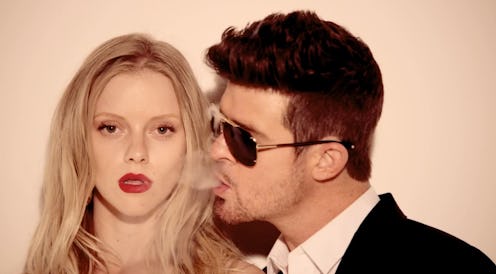Entertainment
Robin Thicke Is Willing To Degrade Women For Fame

Before his summer track “Blurred Lines” hit the airwaves, it's fair to say that Robin Thicke wasn't on too many radars. While the R&B singer – also known for being the son of Alan Thicke, aka the Dad on Growing Pains – has enjoyed several hits, he had yet to fully break out on the charts. Perhaps most well-known for his song “When I Get You Alone” (an underrated favorite... until Glee turned their version into a smash in Season 2), Thicke has garnered the reputation of being a poor man's Justin Timberlake — talented, sure, but not particularly unique or memorable.
And then came "Blurred Lines." Suddenly, Thicke was blipping on the pop culture radar. The song was catchy enough to make it to No. 1 on iTunes. But while it's stirring up publicity for Thicke, it's also stirring up controversy. The lyrics of "Blurred Lines" have Thicke whispering into the ear of a "good girl" who "must wanna get nasty"... even though she never tells him so. She's the "tease," while Thicke is the man who wants to "liberate" her through sex.
The latter description seems innocent enough. (Well, as innocent as sex can be.) But there's another side to the song. Throughout "Blurred Lines," Thicke repeatedly whispers, "I know you want it." But how does Thicke know? Because she's a woman? Because they're hooking up? Because she's dancing close with him? Maybe that's how he thinks that he knows, but the fact remains that he's never once given a real indication by the woman that she "wants it."
It would be easier to accept that she did want it if not for the song's controversial accompanying music video. In the original version (which was quickly banned from YouTube), Thicke parades around with models wearing nothing more than flesh-colored g-strings. The video — co-starring Pharrell and rapper T.I. — is beyond bizarre, with one scene intercut to show balloons that spell out "Robin Thicke Has a Big Dick." But the craziest thing about it? The men are all fully dressed in suits. Why couldn't the women get the same clothed courtesy?
This is Thicke's biggest hit yet by far – but it's receiving almost exclusively negative press. When GQ interviewed Thicke about whether he believed the video and song to be degrading to women, Thicke responded... questionably: “People say, ‘Hey, do you think this is degrading to women?’ I'm like, ‘Of course it is. What a pleasure it is to degrade a woman. I've never gotten to do that before. I've always respected women.’ So we just wanted to turn it over on its head and make people go, ‘Women and their bodies are beautiful. Men are always gonna want to follow them around.’”
It seems that Thicke is admitting that he's looking for a way to shake up his image, and to change the way that women are viewed within his music. (This is a squeaky-clean man, after all, who has had a happy relationship with wife Paula Patton for 20 years.) Clearly, Thicke is looking for controversy – having a video featuring naked models riding bicycles and strutting around seems more like a male fantasy than a celebration of a woman's body. But what Thicke may see as harmlessly edgy is actually more dangerous than he believes it to be. It may be a way for Thicke to enjoy his real big break-out — controversy often breeds commercial success — but what exactly is Thicke promoting with his edgy material? The idea that it's okay for men to pressure women into sex – because, ultimately, they want it even more badly than the men do?
The sexualization of women in music isn't new, but what is new is how people are reacting to it. This song doesn't exist in a vacuum — it comes on the heels of several recent cases where lines like "she was asking for it" have been used to excuse rape. Let's take the case in Steubenville, Ohio, where a female Steubenville High School student was sexually assaulted by her peers while passed out at a party. When she reported the assault, a huge wave of backlash on social media came back to her — who was she to ruin the lives of these boys when she was the one who was "asking for it" with her behavior?
Thicke may have made a good career move with "Blurred Lines," which could very well remain on the charts this entire summer. His song is certainly not the only one in recent memory that has been criticized for promoting violence towards women. Yet in 2013 — when we know what we know about rape and victim-blaming — why should we celebrate Thicke's song and video? And shouldn't Thicke know better than to demean his female fan base? Perhaps, in this case, there are multiple people to blame: Thicke for putting out the song and us for continuing to listen.